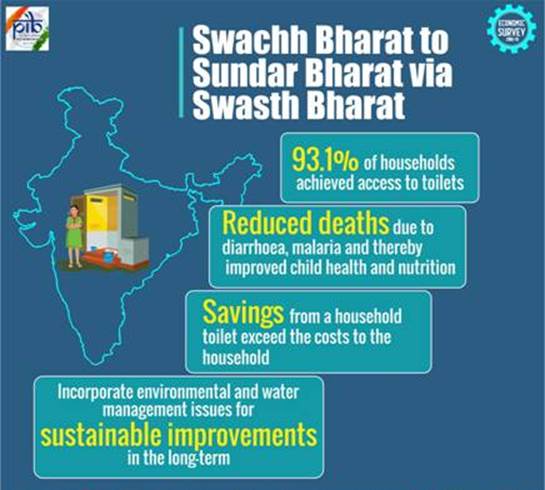Description

Copyright infringement not intended
In News
- Swachh Bharat Mission Grameen (SBM-G) achieved a new landmark with nearly 101462 villages that have declared themselves as ODF (open defecation free) Plus.
- These villages have maintained their ODF status and they also have systems for managing solid and/or liquid waste.
Related news
- Recently The Union Government has launched Revised Swachh Certification Protocols under Swachh Bharat Mission to sustain Open Defecation Free Status.
- The main objective of the initiative is to set guidelines for ODF, ODF+, ODF++, and Water+ certifications.
- ODF - Area once certified as ODF, they became eligible to be declared as SBM-ODF+ & SBM-ODF++.
- ODF+ - Area could be declared as ODF+ if, “at any point of the day, not a single person is found defecating and/or urinating in the open, and all community and public toilets are functional and well-maintained.”
- ODF++ - The ODF++ status adds an extra condition that emphasizes on mechanized cleaning of septic tanks and sewers. Safe collection & treatment of used water as well as safe management of faecal sludge.
- Water+ - The focus is on the collection, transportation, treatment, and reuse of both used water and faecal sludge to prevent environmental pollution.
Swachh Bharat Mission
- Swachh Bharat Mission (SBM) is a country-wide campaign initiated by the Government of India in 2014 to eliminate open defecation and improve solid waste management.
- It is a restructured version of the Nirmal Bharat Abhiyan launched in 2009.
- Phase 1 of the Swachh Bharat Mission lasted till October 2019.
- Phase 2 is being implemented between 2020–21 and 2024–25.
- The mission aimed to achieve an "open-defecation free" (ODF) India by 2 October 2019, the 150th anniversary of the birth of Mahatma Gandhi through the construction of toilets.
- The objectives of the first phase of the mission:
- Eradication of manual scavenging.
- Generating awareness and bringing about behaviour change regarding sanitation practices.
- Building capacity at the local level.
- The second phase of the mission aims to sustain the open defecation-free status and improve the management of solid and liquid waste, while also working to improve the lives of sanitation workers.
- Under the scheme, the Government provides subsidies for constructing toilets, waste management structures, and awareness campaigns to bring behaviour change.
- The campaign is financed by the Government of India and state governments.
- The mission is split into two: Rural and Urban.
- In rural areas "SBM - Gramin" is financed and monitored through the Ministry of Jal Shakti.
- In Urban areas "SBM - urban" is overseen by the Ministry of Housing and Urban Affairs.

Present Status
- According to the dashboards maintained by ministries, more than 100 million individual household level toilets have been constructed in rural areas and 6 million household toilets in urban areas.
- Nearly 6 million community and public toilets have also been constructed in the urban areas.
- Nearly 11 crores of online Integrated Management Information systems (IMIS) have been constructed in the country.
- Nearly 2 lakh Community Sanitary Complexes (CSCs) have been constructed under the programme.
- More than 4,200 cities and more than 600,000 villages across the country have declared themselves open defecation-free (ODF).
- More than 87 thousand wards in urban areas now have 100% door-to-door collection of solid waste and nearly 65 thousand words practice 100% segregation of waste at source.
- According to UNICEF, the number of people without a toilet has been reduced from 550 million to 50 million.
- The World Bank reports that 96% of Indians who have a toilet use it.
Way Forward
- Since the launch of this Mission, lakhs of citizens, especially women, children and divyangs, are living a life of dignity and safety.
- The need of the hour is to maintain these sanitation achievements while moving towards new sanitation goals.
https://www.pib.gov.in/PressReleasePage.aspx?PRID=1853131
https://t.me/+hJqMV1O0se03Njk9













